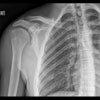HIV causes structural heart disease -- which suggests that cardiovascular screening in all HIV patients, particularly those with a positive blood viral load, should be conducted, according to research presented at EuroEcho-Imaging 2013 in Istanbul.
Dr. Nieves Montoro from the Hospital Universitario La Paz de Madrid in Madrid and colleagues, evaluated whether the stage of HIV or the detectable blood viral load were related to the degree of heart disease. The team included 65 HIV patients who had shortness of breath graded as more than class II on the New York Heart Association (NYHA) Functional Classification scale. Montoro's group determined each patient's stage of HIV by measuring the CD4 count and opportunistic diseases.
Patients had a transthoracic echocardiogram to assess whether they had structural heart disease (including ventricular hypertrophy, systolic or diastolic dysfunction, or pulmonary hypertension); the team assessed cardiovascular risk factors such as hypertension, diabetes, smoking status, dyslipidemia, and renal failure.
Forty-seven percent of patients had some form of structural heart disease, mainly left ventricular hypertrophy, left ventricular dysfunction, pulmonary hypertension, and signs of right ventricle failure. Patients with a positive blood viral load had a significantly higher incidence of structural heart disease than those with an undetectable load, according to Montoro's team.
"Our study shows an association between the presence of the virus in the blood and cardiac disease," Montoro said in a statement released by EuroEcho-Imaging. "These findings open the door to the hypothesis that HIV is involved in the etiology of cardiac damage ... Detecting cardiac problems in HIV patients sooner using a simple diagnostic tool like echocardiography will enable us to treat them in the very early stage of the heart damage and improve their prognosis."



















